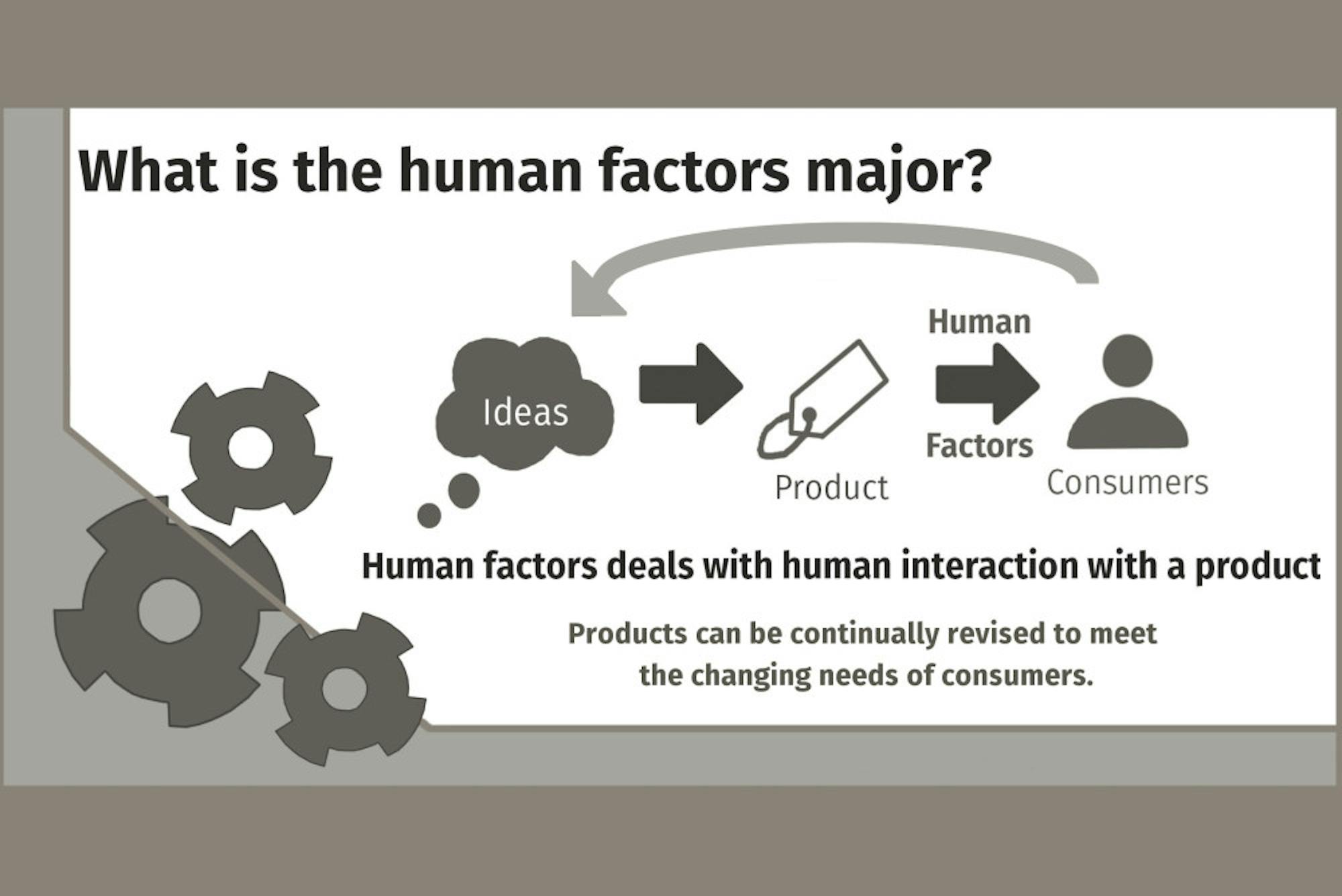The study of human factors explores how to optimize user experience and contribute to market success, focusing on the design of products through the lens of user functionality. A pre-professional society at Tufts, Tufts Human Factors and Ergonomics Society (THFES) is dedicated to providing resources for Tufts undergraduates studying human factors through various workshops and a mentorship program.
“Human factors studies how people interact with things," THFES President senior Matt Marber said. "That can be as specific as the way somebody interacts with their app on their phone or something more ergonomic related, such as the design of a chair to make it as comfortable for as many people as possible."
Senior Daniella DiPaola, THFES vice president of corporate relations, said she became interested in the field of human factors studies because of its practical ties to studying engineering.
"I found that in my courses I wasn’t getting what I wanted to out of design," she said. “I love watching people and thinking about how they work and behave and think, and then being able to take that and make a really cool design from it."
The designs of iPhones and Facebook provide some of the best examples of human factors understanding, according to Marber.
“The design of the Facebook page is always changing -- that’s purposeful," he said. "You can do testing on the website using eye tracking … You can monitor people’s workflow and design something to match people’s mental models...”
Because few people are especially familiar with human factors and ergonomics, THFES has historically been a relatively small group on campus, according to DiPaola. She believes THFES provides a forum for the small group of human factors students to come together.
“Human factors isn’t a major that most people know about, so it’s nice being in a community where other people are interested in the same things as you and understand where you’re coming from,” she said.
The human factors major, also known as engineering psychology, is an interdisciplinary program, jointly offered through the School of Arts and Sciences under the Department of Psychology and the School of Engineering under the Department of Mechanical Engineering. According to its website, the major consists of classes from both schools.
According to DiPaola, there are positive and negative aspects stemming from the major's association with both schools.
“In a good way, we get the resources from those two different departments, but in a bad way, we don’t have our own personal resources, and sometimes we’re not considered our own department because we’re within two other departments," she said. “I came to Tufts because I wanted a liberal arts and engineering education, and I found the perfect blend between the two, and I feel like I’m a well-rounded student after this program."
Marber explained that the group is working to develop a mentorship program to help human factors majors balance classes between the schools.
"[The program doesn’t] really fit into any school that well," he said. "You’re in the psychology department, but you’re [taking] engineering classes. Then on the other side of things you’re in the engineering school, but you’re taking psych classes. So it’s a weird liminal space stuck between both sides."
As undergraduate mentors through the Department of Mechanical Engineering,Marber and DiPaola also provided advice for human factor classes and jobs at their office hours.
"[The Tufts Engineering Mentors Program], for instance, is fantastic, but that is for the engineering side so it doesn’t cover to the arts and sciences students," Marber said. "So [what] we’re trying to do is develop something internally, having the upperclassmen assist the lowerclassmen, helping them with their course selection, figuring out how to [choose a] major … [DiPaola and I] do office hours for people to come to us with any help with any questions related to human factors classes, advice for job help, critiques for program department, where they would like to see the program headed for the future."
According to Marber, THFES also provides undergraduates with the opportunities and resources available within the overall field.
“We do this through different workshops on campus [and through] field trips to companies in the greater Somerville/Boston [area] that have different specialties, so you can see where you can go in the field, as well as [through] bringing speakers to campus," he said.
Among those events is an upcoming workshop on Tuesday, Nov. 10 with BostonCHI -- an organization of professionals in the field of human-computer interactions -- on human factors in medical devices, according to Marber.
“We’re thinking about a few company tours,” DiPaola said. “One is with Cambridge Consultants, which is a human factors consulting firm in Boston, and another one is Paytronix. They’re a software company nearby, and they recruit a lot of Tufts human factors engineers.”
Additionally, thanks to the resources of its subgroup, the Tufts Makers Network, THFES is able to use advanced equipment outside of classrooms for free, DiPaola said.
“In our coursework we don’t necessarily get a lot of prototyping just because of time and resources, so it’s really helpful to have that group that provides extra support to use 3D printers or laser cutters or just about anything,” she said.
As more companies are recognizing the significance of human factors, there are more opportunities for people in the field, Jennifer Carroll (LA '07) noted. Carroll studied engineering psychology through the School of Arts and Sciences and is now an experience design consultant at PJA Advertising and Marketing.
Carroll explained that her work process begins with research on user needs and wants and ends with testing user reactions to prototypes developed based on the original research.
Carroll believes that her study of human factors at Tufts has been helpful for her work.
“When I was [at Tufts], it was one of the only undergrad programs in the country in this area," Carroll said. "I definitely went into the workforce...a step ahead. [Human factors] seemed to be a really nice major that has the artistic side and science side.”
As technology develops and more aspects of day-to-day life make their way into a digital setting, human factors will become increasingly important, according to Carroll.
“Everything is online,” she said. “You have to have somebody thinking about how it works, how it needs to work best and [is] constantly going back and making that change and keep[ing] things up to date.”
Tufts Human Factors and Ergonomics Society revamps for this semester






